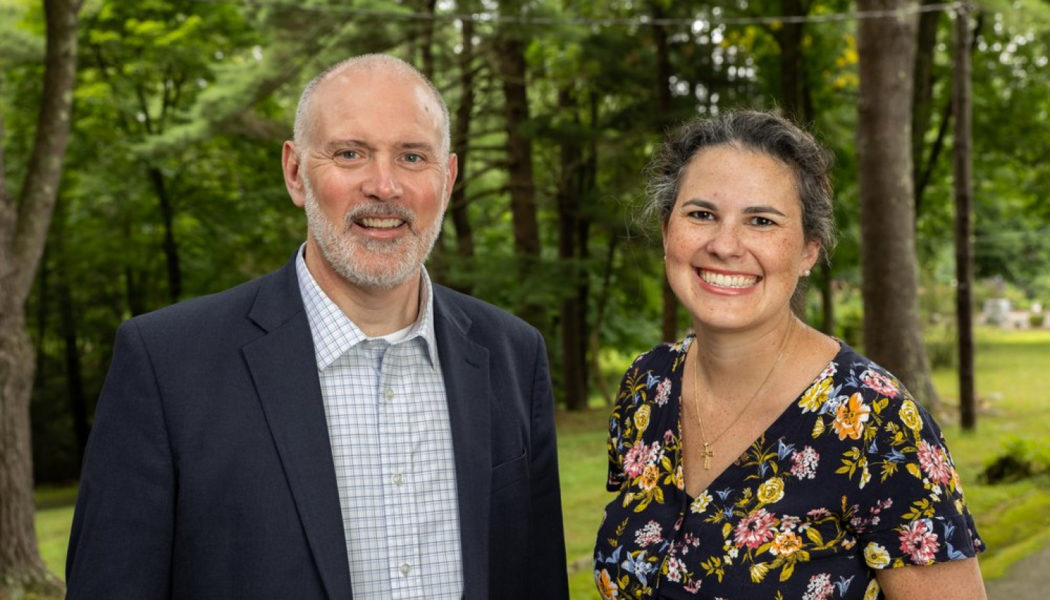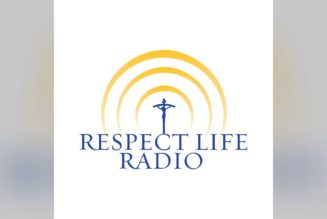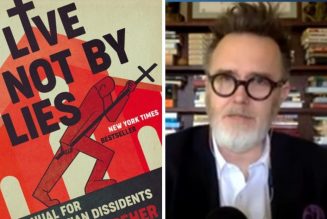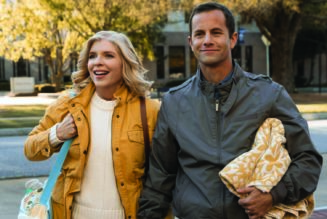
Peter Sonski has been on a political journey since he first registered as a Democrat in the late 1970s. He hailed from a blue-collar, working class, Catholic family — very much concerned with the underprivileged and vulnerable of society. In a post-Roe v. Wade political landscape, however, the Democrat Party “decidedly became very pro-abortion” in his estimation, while, concurrently, President Ronald Reagan consolidated the pro-life movement.
Much like Reagan, who famously declared, “I didn’t leave the Democratic Party. The party left me,” Sonski felt abandoned by the Democrats who “forgot the little guy” in their abortion advocacy. Yet after years as a Reagan and then George H.W. Bush supporter, he discerned that the Republican Party also abandoned him, not completely aligning with his Catholic faith on economic issues.
Thrusted into the political wilderness, Sonski was politically “homeless” from the mid-1990s to 2018 — albeit serving as an elected official for nearly a dozen years — until a friend in his home state of Connecticut introduced him to the American Solidarity Party (ASP).
Founded in 2011, ASP is an independent party that believes in “the tradition of Christian democracy.” According to its website, the party vies to uphold a vision of the common good and “of each individual informed by Christian tradition” by protecting the sanctity of life, while promoting social justice, a community-oriented society, centrality of the family, economic security, care for the environment, and peace and international solidarity. The party also claims it is the fastest-growing political party in the United States.
To Sonski, the party “fit like a glove” since it “stood for all of the values that I stood for.” Today, he is the party’s representative for President of the United States after securing the nomination on June 2. Along with his running mate Lauren Onak, the ASP ticket is currently on the ballot in two states, Arkansas and Hawaii. Both are working to increase ballot accessibility and visibility by campaigning across the country, along with raising awareness on social media.
In a wide-ranging interview, Sonski explains his stance on breaking through America’s two-party system; how both major parties have fallen short on the pro-life issue; international affairs; localism in education; and the status of faith in a post-Christian United States.
First and foremost: Why are you running for president?
I am frustrated with the options that we’ve had in the last two presidential elections and the options shaping up to be offered in the 2024 election. …With 300-plus million people in the United States, if those two individuals [Joe Biden and Donald Trump] are the best that the parties have to offer, I think there is a lot of fault those parties have to bear for not looking for better options.
Third parties are alternatives; they haven’t been legitimate alternatives, but I think they are becoming more recognized as viable alternatives because people feel, like I do, that the options put before them by the major parties aren’t wanted.
I think some of the values I have that the other parties are not offering need to have more voice — they need to get more airing.
Look, I understand that I’ve got an all-uphill climb; I am just working hard in the hopes of being able to get ballot access, let alone to get ballot access then off to get me 270 electoral college votes. But if I can be a candidate that’s speaking for principles and values that other candidates are not, I hope that they can reach the ears to voters, and those voters can bring their concerns to whoever is elected in 2024, whether it’s the president, the governor, or their senators and representatives in the federal or state legislatures. …
I’ve been very candid throughout the primary and through my, throughout my now public candidacy, I don’t expect to be changing residence to 1600 Pennsylvania Avenue in 2025. It’d be wonderful if that were the case but you know the chances of that are very miniscule. What I will consider a win is if I am able to grow the American Solidarity Party, both in size and in influence: we’ve got to be able to become better known, better respected, and better integrated into communities around the United States.
What do you say to someone who believes voting for a third-party candidate is ‘throwing away’ their vote?
Let me start with third parties in general. Naturally, I am very supportive of them. …We are at a point where I think the two major parties have one agenda and that is to eliminate third parties from consideration. They want to keep this duopoly in place, and you know the balance of power tips only minimally. Right now, it’s only a modest advantage for the Republicans in the House of Representatives, the Democrats control the upper chamber in the Senate and the White House; it’s apt to flip in the next election. ‘If we’re in power, we’re working hard to preserve power, if we’re out of power, we’re working hard to regain power’ — and it’s all about getting or maintaining the grip on the chamber or that element of governance.
Third parties are more common in other places; they challenge the status quo of the duopoly because, hopefully, they are allowing or preventing — I should say — either of these two parties from gaining a majority, and forcing a coalition to result in legislation to be passed.
Most voters have a difficulty in understanding anything outside the R or D, red or blue, the left or right paradigm. And so, I understand when people say ‘I’m wasting my vote if I vote for you’ because only a Republican or a Democrat matter. Well, the reality is, as long as you hold to that paradigm, that point of view, it’s going to be true. If you can allow yourself to differentiate a system that’s operated by two parties or monopolized by two parties, and think of the potential of other parties having a voice and having different values, different perspectives, and being active in the governing process, then I think you can accept that your vote is not wasted. Your vote is more representative of your own doubts because presumably — I hear it all the time — people are voting defensively. They’re voting for what they don’t want because they don’t like the other even more. Vote for the lesser of two evils, right? Well, if you’re voting for the lesser of two evils, it means that you obviously don’t prefer either. …So I’d like to provide people this presidential election with an opportunity to vote for something that they value and something they prefer. …and I think [the ASP’s platform] has a broad appeal to the electorate.
[But the political culture] has become very tribal.
Being pro-life is central to your candidacy. How have the Republican and Democratic Parties fallen short on this issue in your view?
There are many people in the Democratic Party that I know who are pro-life, who value the life in the womb, but their party doesn’t. …[Meanwhile] there are many in the pro-life community who have deeply embraced the Republican Party, and they give little attention to anyone that is pro-life who aren’t Republican because they believe that the Republican Party — and having a major party stating its support of the child in the womb — is the only option for them to be effective.
Look, I acknowledge that Donald Trump appointed three justices to the Supreme Court in a four-year span. …But I would dare say that in 50 years, from the early 1970s until the early 2020s, the Republican Party did little to mitigate the Roe v. Wade position. They were not what I would call very strong legislatively or even for that matter in the executive branch outside of executive actions like the Mexico City Policy — I mean, I’ll give them credit for the Hyde Amendment, and preventing government tax dollars from paying for abortions. But in terms of reversing Roe v. Wade or enacting laws that would strictly limit abortion, I don’t think the Republican Party has a lot that it can offer to its credit.
So, I at times am frustrated when I listen to those in the pro-life movement and their strong embrace of the Republican Party. While I acknowledge the Democrats are exactly the opposite on this issue, I would offer that there are many things that appealed to me about the Democratic views that I think Republicans and those in the pro-life movement overlook.
A lot of women make a decision today to abort a child not because they want to be empowered, not because this is going to get position at work or they’re going to have greater earning capacity or they’re going to have a more meaningful existence in their lives as women: they’re choosing to abort their children because they don’t feel that they have the economic ability to raise a child, to rear a child, to provide them with good housing and good health care and, and the opportunities that they would prefer for that child. So, the decisions that they make are gut wrenching, and these are policies that the Republican Party often works in opposition to.
We need to find ways in which we can make it a more desirable decision to bring children into the world instead of merely saying that killing a child in the womb is wrong. Yes, it is! But we also have to invite policy that supports rearing children.
How does euthanasia and capital punishment fit into your views on improving the sanctity of life?
We are supportive of the elderly and infirm who are in despair, and often thinking about or even having recourse to euthanasia. We want to be able to say that this life has merit, this life has value, this life has dignity, and it needs to be respected and preserved, and treated with the proper medical care to help them in their suffering and anxiety. …
We respect the life of those that are sentenced to death. We are opposed to capital punishment. I strongly believe no one is the sum of all their failures and faults. Yes, people do heinous things, but they have an innate dignity that is not lost despite the terrible things that they do. We oppose killing them, especially because so many of the people on death row tend to be from the lower classes of society, unable to properly defend themselves, perhaps victims of racial bias, and have found themselves convicted, at least in part, if not in whole, because of those factors.
The Democrats are opposed in principle to capital punishment, but they have been advocates for abortion and euthanasia. The Republicans might be opposed to abortion and euthanasia, but have been long time holdouts in keeping capital punishment on the books. [ASP] differs plainly from the two major parties; but I think ours is a much more holistic, complimentary view of life throughout its entire duration.
What policies would you enact if elected to promote the sanctity of life?
We’ve got to be to provide access to affordable health care that provides assistance to moms while they’re pregnant, during delivery and post-partum so that the child gets the proper care it needs throughout the pregnancy and through childhood.
The next major item has got to be leniency on the part of employers with leave. We’ve got to allow moms and dads the opportunity to spend time with their newborn so that they can rear them and give them the nurturing that they deserve in those early weeks and months of life. That nurturing is so valuable.
We’ve got to make sure we are giving people an opportunity to get good access to childcare. Today, unfortunately, it takes two incomes in many cases to support a household. So, if mom does need to go back to work, we’ve got to make sure that we have good access, affordable access to childcare so that they can do that and still raise a family. We’ve got to make sure that they have access to safe and affordable housing so that they can feel confident in providing a loving home for their kids.
We got to hold dads accountable. We’ve got to make sure that fathers who are not part of the family — maybe because they are not married or preferred to not have the child in the first place — are responsible for providing for the needs of their mom and child. …
[As for implementing these policies], there’s going to be some regulation and some corporate initiatives. There’s going to probably be incentives for employers that provide [childcare] programs. …If there are landlords that are providing more affordable housing, then they’re rewarded in another away, perhaps through property tax relief. Obviously, this is not all going to happen at the federal level. It’s got to be something that is embraced at all levels of government to provide the supports necessary.
With the recent conflict in Israel, as well as the ongoing Russian invasion of Ukraine, what is your and American Solidarity Party’s view on foreign affairs?
We want to have an international community that has respect for each other and a respect for human beings — so avoiding war at all costs, non-nuclear proliferation — all of these things are what the party stands for.
Now we have active conflicts in Ukraine, Russia having attacked them. Throughout my candidacy in the primary and now my candidacy as the nominee, I have supported sanctions imposed on Russia — to penalize it for its incursion into Ukraine. I support humanitarian aid for the people of Ukraine. I support defensive assistance to Ukraine so that they are not overrun by Russia, and I continue to call for diplomatic ways for the war to end. This circumstance that has happened in Israel — the attack by Hamas — is gut-wrenching. There are no two ways about it: this nihilist group breaks through borders and goes out and just willfully kills, rapes and causes all kinds of terror, and then takes more than 100 people back hostage.
But I’m panicked. There are two million people confined in a space that is landlocked by a border wall. This is a space roughly half the size of New York City that is [going to be] bombarded by Israel. They are going to make all sorts of artillery assaults, aerial assaults, and they’ve talked about a ground attack in there to both liberate the hostage and to eradicate, to destroy Hamas completely — those are objectives that I certainly understand and support. But I’m very, very concerned about the human welfare of the Palestinian people within that confine that have no escape.
As the war unfolds, and as Israel begins its efforts to liberate its hostages and eradicate Hamas, there’s going to be more grim and gruesome accounts, and it’s going to be difficult for [civilians] because how does Hamas act? They don’t act as an army. They’re not dressed in fatigues. They’re dressed as civilians and hiding in tunnels, multistory buildings and integrating with the people. They are setting up their headquarters in hospitals, schools, mosques and other places — they invite Israel to make targets. They have no regard for civilian casualties. It’s going to be very ugly, and the cost of war is very high. …Naturally, I feel for the people of Israel, the hostage situation, and the desire to liberate those hostages and support whatever initiatives in principle, and to rid Hamas to be able to have more confidence of the safety for the people of Israel as a result of that. But I’m also worried that Hezbollah and other terrorist groups or bad actors in the region might try to take advantage of the situation and it escalates.
I really don’t want America involved in this combat: to be sure they’re providing intelligence and guidance in the hostage liberation efforts; but I certainly am not in favor of boots on the ground or planes in the air.
What is your view on the rise of inflation and labor?
When I was around 30 years old, I was buying my third house already, moving up and advancing. My own kids, who are in their 30s now, only one of them — and I have nine kids — has been able to afford a house so far. It’s a very difficult economy, and people are saddled with debt, people are saddled with wages that haven’t kept pace, and it’s a challenge. We’ve got to do more.
I live in a rural community, but it’s impossible for my kids to live here because the houses are on lots that are minimum an acre. How can somebody afford that as a starter? They obviously can’t — they have to inherit it or work for a long, long time. I feel the frustration of people who are not able to live to a standard that they’ve known, or their parents have known.
I point the finger at the government who is not doing enough to impose either regulations or incentives that allow for real, meaningful change. And [I point the finger at] businesses too. Especially during the pandemic, it seems like these big tech companies — like Amazon, Google, Meta and others — just kept getting bigger and treated people like they’re just another component of raw material. You’re a laborer, and you’re at the whim of the organization, they want to downsize, they cut your department and you’re gone – you’re out on the pavement looking for new work. The respect for labor is no longer the case.
[ASP] is very pro-labor. I support the United Auto Workers (UAW) and their efforts to get a better contract for themselves so that they can provide more for their families.
You have spent time as a member of your community’s Board of Education. With education becoming a hot-button issue since the pandemic, what is the role of government in education?
We are a great nation because we have had a great system of education. …I don’t necessarily like the bureaucracies that are associated with education. As a local school board member, I had a keen insight into the values of my community and the needs of our learners in my community. And I want to provide for those students in unique ways. Instead, we get a number of mandates, policies imposed upon us from either the state legislature or the state Department of Education, and even from federal levels. And we have no choice but to implement them. We might be able to nuance the way they are presented, but by and large, we don’t have the ability to define and direct our own education locally.
The American Solidarity Party is strongly in favor of subsidiarity — of having authority at the lowest, competent level. It’s the level that really serves the people. It’s closest to the people; it understands the local needs and it serves the local needs. As a board member, I’ve often felt that outside of voting for the selection of our superintendent, and perhaps putting more emphasis on certain areas of our budget than others, that I have had as much influence as I’d like to have on policy and on curriculum because so often that’s governed from levels above. So, I value education keenly.
I want to support [education] both publicly, as well as to allow families that opt to select private methods of education, including homeschooling their children, because I believe that a family has the right and is the first teachers of their children. So they should have the opportunity to determine what is best for their family, for their children to educate and form them.
I would look to streamline, and that would include getting rid of the federal Department of Education altogether — to get rid of one layer of bureaucracy in the realm of education.
Since the American Solidarity Party is founded on Christian democracy, what is the role and status of faith and religion in society today?
So many people today allow their religious views to be shaped by their political views or they’re willing to dismiss portions of Catholic social teaching, for example, because their party may not uphold that.
The preferential option for the poor, for example, that Catholic social teaching invites us to consider, people who are pro-life Republicans may not feel as though that is a teaching that they can embrace — or the injunction to be good stewards of the environment. That doesn’t always compliment Republican positions.
I am not advocating for integralism because we are a pluralistic society — and I’m certainly not advocating for theocracy. But what I am saying is that the tenets of Catholic social teaching apply to the common good. They apply to all in society. They are not distinct to Christians or Catholics. They are for the welfare of all. So, I embrace them for that very reason — that they are not limited to any one class, sex, race — they are universal.
[The platform of the ASP] is a better way or more holistic way, well-rounded view of their Christian faith if indeed that is what they profess. …
We are post-Christian now. We’ve moved beyond that. And sadly, we have distanced ourselves from those Christian values, those circumstances that caused our Founders and forebearers to embrace their faith — it is not the same as it was for them. We don’t know the hardship; we haven’t had to fight a war on our soil since the Civil War. I hate to use the word spoiled, but in so many ways, we don’t know the trials and tribulations of others that quite often causes people to have recourse to faith. But we still have to acknowledge that the tenets, the principles of faith apply to the goodwill and common good of all. That’s what the American Solidarity Party is about, and that’s what we’re trying to make available to voters in the 2024 presidential election.







